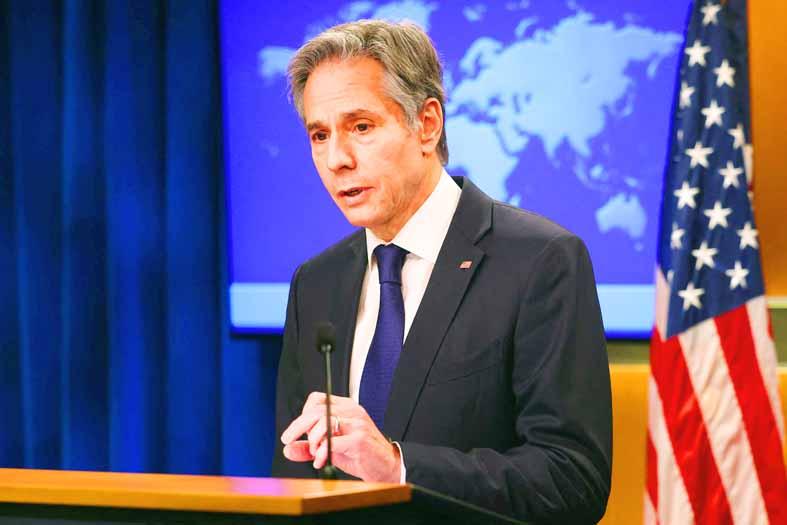US Secretary of State Antony Blinken on Tuesday spoke with Lithuanian Prime Minister Ingrida Simonyte and underscored the US’ “ironclad” solidarity with the Baltic nation in the face of pressure from China.
“It’s important for all partners in the EU, US and Indo-Pacific to work together to counter acts of coercion,” Simonyte wrote on Twitter yesterday after the call with Blinken.
Beijing has imposed a series of political and economic sanctions against Lithuania since it agreed to host the Taiwanese Representative Office in Lithuania, which opened in Vilnius on Nov. 18.

Photo: AFP
“Secretary Blinken noted troubling public reports that People’s Republic of China (PRC) customs authorities are not clearing Lithuanian shipments or shipments with Lithuanian components, and that they are rejecting import applications from Lithuania,” a readout by US Department of State spokesman Ned Price said.
“The secretary underscored that such measures would raise serious concerns, including under international trade principles, and appear to constitute a form of economic coercion,” Price said.
“Secretary Blinken highlighted US support for Lithuania in the face of these actions and reaffirmed the US commitment to work with like-minded countries to push back against the PRC’s coercive diplomatic and economic behavior,” he said.
In Taipei, the Ministry of Foreign Affairs thanked Washington for demonstrating its leadership in the global alliance of democracies.
The government is convinced that the US would take concrete steps to help democratic partners counteract the political and economic coercions of authoritarian regimes, ministry spokeswoman Joanne Ou (歐江安) said in a statement.
Taiwan, as a democratic success story and a force for good in the world, would continue to develop practical and friendly relations with all like-minded countries, she said.
The government would also work with the US and other democratic partners to help Lithuania tackle hybrid threats imposed by authoritarian regimes and defend democratic institutions, Ou said.
The Lithuanian Ministry of Foreign Affairs last week recalled Lithuanian Charge d’affaires ad interim in China Audra Ciapiene to Vilnius for consultations, but added that its embassy in China would continue its operations remotely.
In a statement on Monday, the Lithuanian ministry said that “false information regarding Lithuania’s participation in the Beijing Winter Olympics has appeared publicly on behalf of the [Lithuanian] minister of foreign affairs. The foreign ministry considers it to be an information attack.”
On the same day, Lithuania’s State Border Guard Service wrote on Twitter that it was using uncrewed aerial vehicles donated by Taiwan to survey and bolster the EU’s eastern border with Belarus.
“We’re pleased to see the drones donated by #Taiwan to #Lithuania during the trade & investment tour of 3 #EU members in October being put to good use,” Taiwan’s foreign ministry wrote on Twitter.
In related news, 25 Lithuanian food retailers have joined the Food Taipei trade show to showcase their products.
It opened yesterday at the Taipei Nangang Exhibition Center and ends on Saturday.
If the COVID-19 situation allows, Lithuanian Minister for Agriculture Kestutis Navickas would lead a business delegation to visit Taiwan next year, the Lithuanian Ministry of Agriculture said last week.
Additional reporting by CNA

NATIONAL SECURITY THREAT: An official said that Guan Guan’s comments had gone beyond the threshold of free speech, as she advocated for the destruction of the ROC China-born media influencer Guan Guan’s (關關) residency permit has been revoked for repeatedly posting pro-China content that threatens national security, the National Immigration Agency said yesterday. Guan Guan has said many controversial things in her videos posted to Douyin (抖音), including “the red flag will soon be painted all over Taiwan” and “Taiwan is an inseparable part of China,” while expressing hope for expedited “reunification.” The agency received multiple reports alleging that Guan Guan had advocated for armed reunification last year. After investigating, the agency last month issued a notice requiring her to appear and account for her actions. Guan Guan appeared as required,

A strong cold air mass is expected to arrive tonight, bringing a change in weather and a drop in temperature, the Central Weather Administration (CWA) said. The coldest time would be early on Thursday morning, with temperatures in some areas dipping as low as 8°C, it said. Daytime highs yesterday were 22°C to 24°C in northern and eastern Taiwan, and about 25°C to 28°C in the central and southern regions, it said. However, nighttime lows would dip to about 15°C to 16°C in central and northern Taiwan as well as the northeast, and 17°C to 19°C elsewhere, it said. Tropical Storm Nokaen, currently

‘NATO-PLUS’: ‘Our strategic partners in the Indo-Pacific are facing increasing aggression by the Chinese Communist Party,’ US Representative Rob Wittman said The US House of Representatives on Monday released its version of the Consolidated Appropriations Act, which includes US$1.15 billion to support security cooperation with Taiwan. The omnibus act, covering US$1.2 trillion of spending, allocates US$1 billion for the Taiwan Security Cooperation Initiative, as well as US$150 million for the replacement of defense articles and reimbursement of defense services provided to Taiwan. The fund allocations were based on the US National Defense Authorization Act for fiscal 2026 that was passed by the US Congress last month and authorized up to US$1 billion to the US Defense Security Cooperation Agency in support of the

PAPERS, PLEASE: The gang exploited the high value of the passports, selling them at inflated prices to Chinese buyers, who would treat them as ‘invisibility cloaks’ The Yilan District Court has handed four members of a syndicate prison terms ranging from one year and two months to two years and two months for their involvement in a scheme to purchase Taiwanese passports and resell them abroad at a massive markup. A Chinese human smuggling syndicate purchased Taiwanese passports through local criminal networks, exploiting the passports’ visa-free travel privileges to turn a profit of more than 20 times the original price, the court said. Such criminal organizations enable people to impersonate Taiwanese when entering and exiting Taiwan and other countries, undermining social order and the credibility of the nation’s